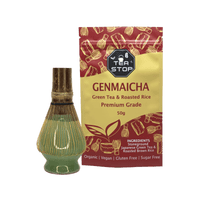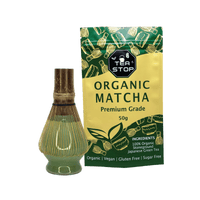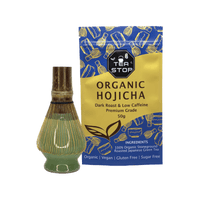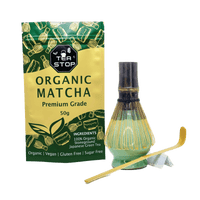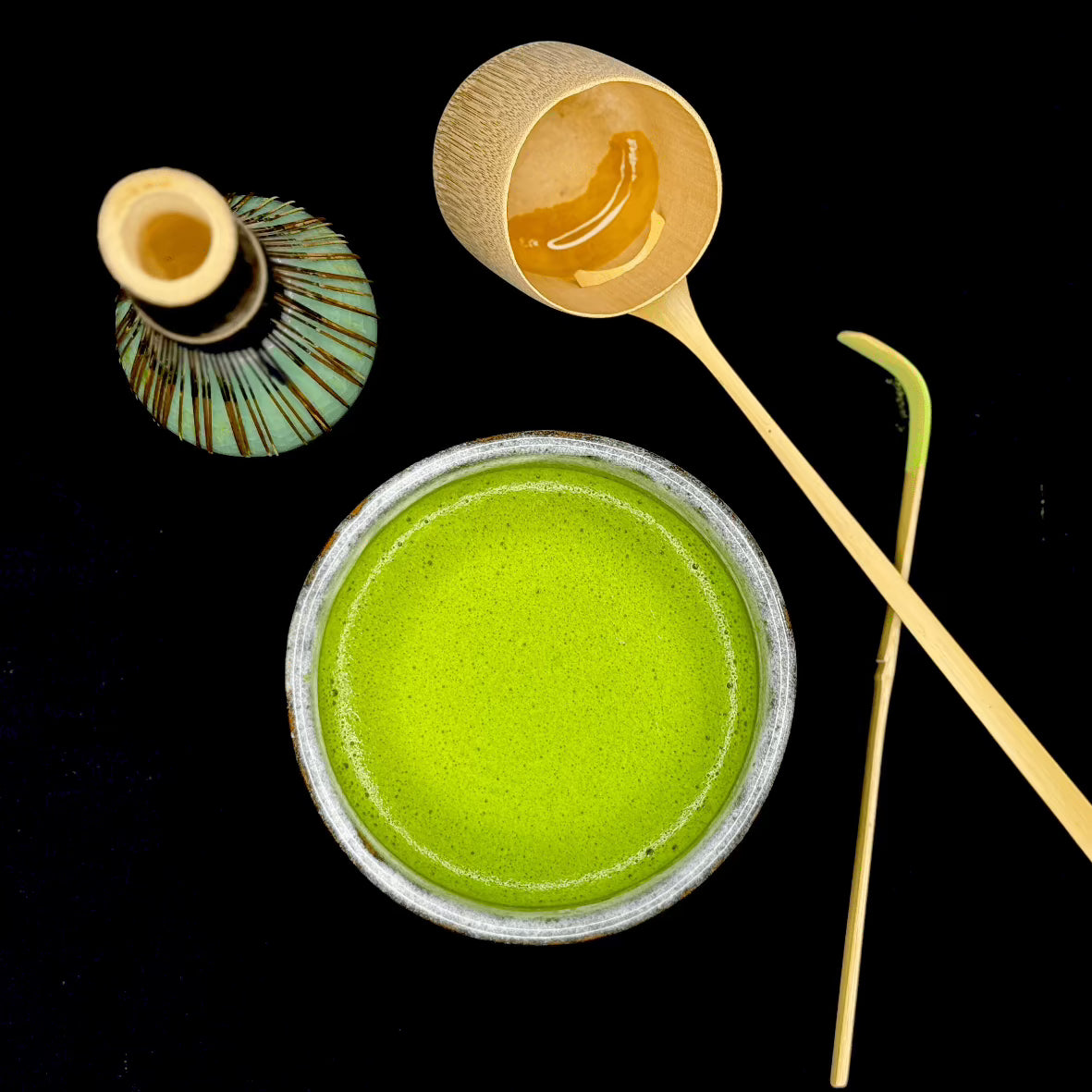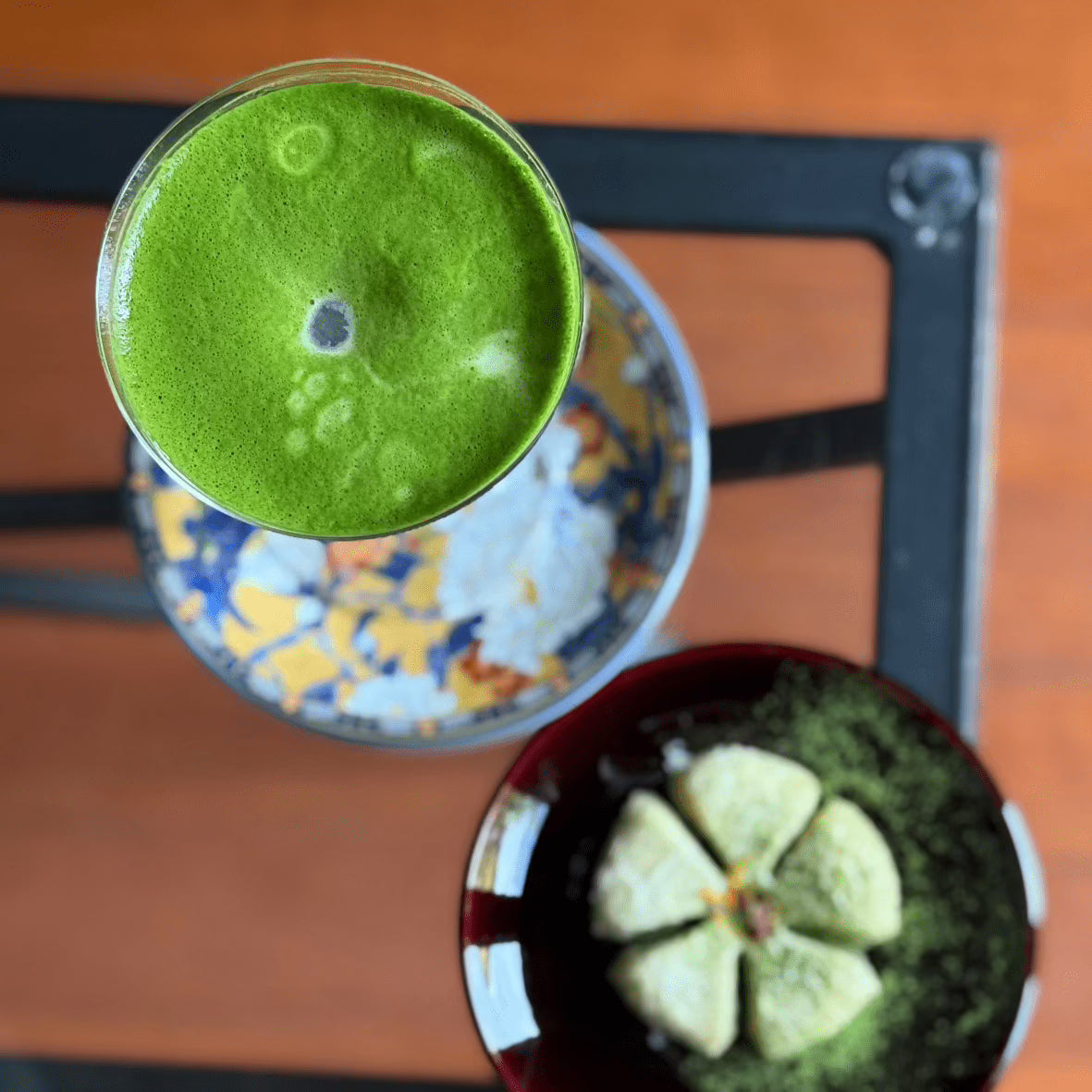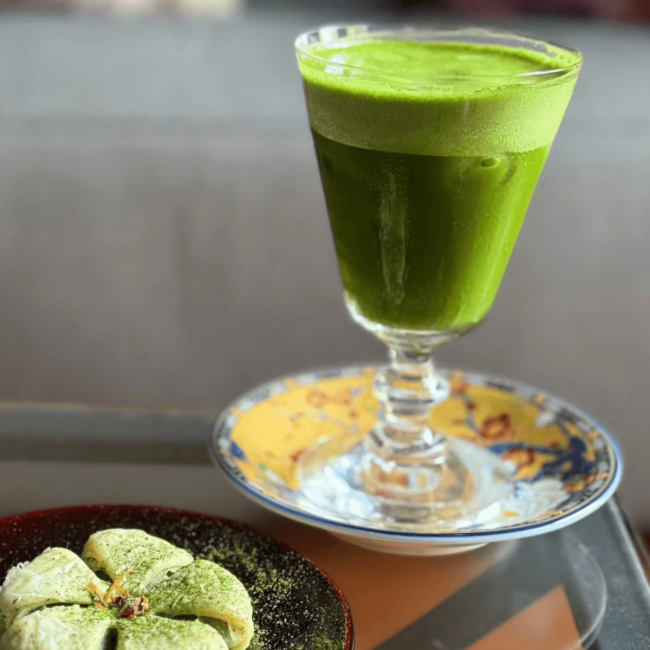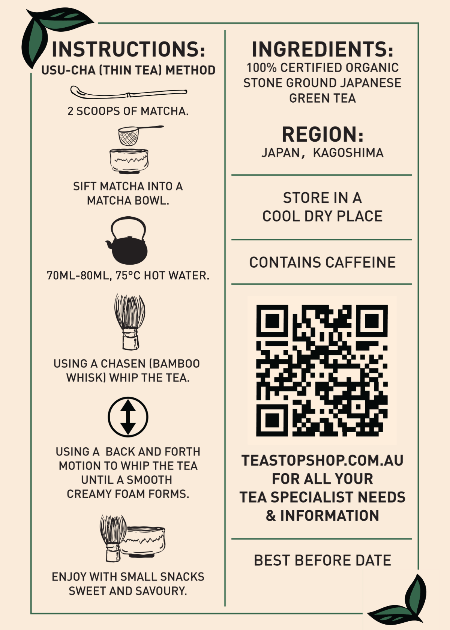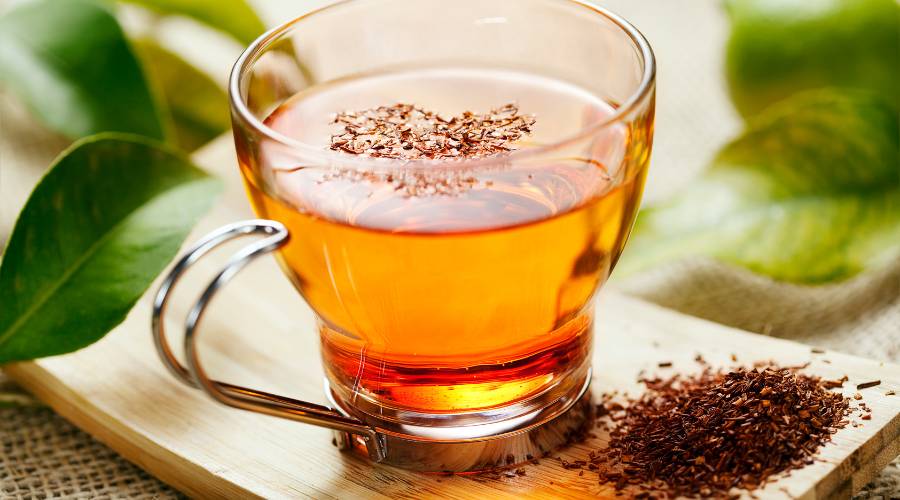
Rooibos: The Caffeine-Free Wonder Tea - Health Benefits and Versatility of Organic Rooibos Chai
Share
Rooibos: The Caffeine-Free Wonder Tea
Rooibos tea, often referred to as the "Caffeine-Free Wonder Tea," has gained significant attention due to its distinctive characteristics and myriad health benefits. Originating from the leaves of the Aspalathus linearis shrub, rooibos is a vibrant red herbal infusion known for its rich, earthy flavor and full-bodied aroma.
The Caffeine-Free Choice
One of the most remarkable aspects of rooibos tea is its caffeine-free nature. This makes it an ideal choice for those looking to reduce their caffeine intake without sacrificing their love for a warm, comforting beverage. As the demand for caffeine-free options grows in today's health-conscious society, rooibos stands out as a flavorful alternative to traditional teas and coffee.
A Soothing Experience with Health Benefits
Not only does this tea offer a soothing experience, but it also boasts numerous health benefits. Packed with antioxidants and devoid of tannins found in other teas, rooibos supports wellness without bitterness. Its versatility extends beyond just a simple brew; it can be enjoyed hot or iced and is a fantastic base for creative concoctions like rooibos chai lattes.
Enhance Your Brewing Experience
You can explore various types of rooibos tea and even find some unique tea sets to enhance your brewing experience. To enjoy your rooibos in style, consider investing in some quality teaware or useful accessories. Embracing rooibos tea as part of your daily routine could be your next step toward a healthier, more balanced lifestyle.

What is Rooibos Tea?
Rooibos tea is a special type of herbal tea known for its unique taste and bright color. It comes from the leaves of the Aspalathus linearis shrub and has no caffeine, making it a great choice for those looking to avoid stimulants. Unlike regular black or green teas that come from the Camellia sinensis plant, rooibos has distinct qualities that make it appealing to many.
Origin of Rooibos Tea:
1. Aspalathus linearis Shrub
The Aspalathus linearis shrub, which produces rooibos tea, is native to the Cederberg Mountains of South Africa. This plant can only be found in this specific area where it thrives in the mountainous landscape. The local soil and climate conditions play a crucial role in shaping the unique characteristics of rooibos tea.
2. Native Habitat
The Cederberg region provides an ideal environment for rooibos cultivation with its diverse ecosystems and rich biodiversity. Here, rooibos can fully develop its wide array of flavors and nutritional benefits.
Traditional Consumption
1. Khoisan People
Historically, the indigenous Khoisan people were among the first to discover the potential of rooibos tea. They would gather wild rooibos plants and use their leaves to brew a comforting beverage, enjoying its natural sweetness and health advantages.
2. Dutch Settlers
In the 18th century, Dutch settlers embraced this tradition by incorporating rooibos into their diets as a more affordable alternative to costly imported teas. This cultural exchange contributed to spreading knowledge about this delightful beverage beyond Africa's borders.
The fascinating history behind rooibos tea showcases how it evolved from being a simple native plant into an esteemed drink enjoyed worldwide, carrying cultural significance along with it.
Health Benefits of Rooibos Tea
Nutritional Overview
Rooibos tea is packed with nutrients, especially antioxidants and polyphenols. These important compounds, especially aspalathin and quercetin, are known for their health benefits. Aspalathin, an antioxidant found mainly in rooibos, helps protect the body from oxidative stress and inflammation. Quercetin adds to these benefits by promoting heart health and reducing inflammation.
Cholesterol Levels and Heart Disease Risk
There's growing interest in how rooibos affects cholesterol levels. Research suggests that drinking rooibos regularly may help balance LDL (low-density lipoprotein) cholesterol and HDL (high-density lipoprotein) cholesterol. By lowering LDL, often called "bad" cholesterol, rooibos may reduce the risk of plaque buildup in the arteries. At the same time, it supports HDL, or "good" cholesterol, which helps remove other types of cholesterol from your bloodstream. This twofold action highlights rooibos's potential role in promoting heart health and lowering the risk of heart disease.
Blood Sugar Management
The antioxidants in rooibos tea also play a significant role in managing blood sugar levels. Aspalathin has been shown to improve insulin sensitivity and glucose tolerance, making it beneficial for those managing type 2 diabetes. Research indicates that incorporating rooibos into a balanced diet may help stabilize blood sugar levels, providing an additional tool for individuals looking to maintain healthy blood sugar.
Weight Management Strategies
Including calorie-free drinks like rooibos in your diet can be an effective strategy for managing weight. Rooibos not only has no calories but also affects hormones related to fat storage and appetite control. Leptin, a hormone that signals fullness to the brain, can be positively influenced by drinking rooibos tea. This interaction between rooibos and leptin suggests its potential role in supporting weight loss efforts by helping regulate food intake and fat storage.
Combating Oxidative Stress
Antioxidants are crucial for maintaining overall health because they fight against oxidative stress—a condition linked to various chronic diseases. Rooibos tea's high antioxidant content helps neutralize free radicals in the body, reducing cell damage and aging processes. By making rooibos a part of your daily routine, you may strengthen your body's defense systems against environmental stresses and improve long-term health outcomes.
The numerous health benefits of rooibos tea make it an attractive addition to any diet focused on wellness and prevention. Its unique blend of nutrients not only supports essential bodily functions but also offers protection against common health issues such as heart problems, diabetes management, and weight control strategies.
The Versatility of Rooibos Tea
Rooibos tea is not only celebrated for its health benefits but also for its remarkable versatility. This caffeine-free wonder can be enjoyed in a variety of ways, making it a delightful addition to any kitchen.
Traditional Methods of Preparation
1. Hot Tea
Brewed like a traditional tea, rooibos offers a rich, earthy flavor profile. Simply steep the leaves in boiling water for about 5-7 minutes to enjoy a comforting hot beverage.
2. Iced Tea
Perfect for warmer days, iced rooibos tea is refreshing and hydrating. After brewing, allow the tea to cool and serve it over ice with a slice of lemon or a sprig of mint for an extra touch.
3. Chai Lattes
Rooibos makes an excellent base for chai lattes. Combine brewed rooibos with spices such as cinnamon, cardamom, and ginger, then add steamed milk for a creamy treat that's both soothing and invigorating.
Cooking with Rooibos
Incorporating rooibos into cooking and baking opens up a world of flavors:
- Flavoring Agents: Use rooibos as an infusion to flavor stocks, soups, or stews. Its subtle sweetness can enhance savory dishes just as well as sweet ones.
- Baking: Add brewed rooibos or ground rooibos leaves to baked goods like cakes, muffins, and cookies. It imparts a gentle, nutty taste that pairs beautifully with vanilla or chocolate.
Comparison with Other Caffeine-Free Teas
Rooibos stands out among caffeine-free alternatives due to its unique composition and flavor:
- Chamomile: While chamomile is known for its calming properties and floral taste, rooibos offers more complexity with its earthy undertones and nutritional benefits.
- Herbal Infusions: Blending rooibos with other ingredients such as lemongrass, peppermint, or hibiscus creates delightful herbal infusions that cater to diverse palates.
Embracing the versatility of rooibos tea allows you to experiment in the kitchen while enjoying its numerous benefits. Whether you prefer it hot or cold, in your latte or your loaf of bread, rooibos promises to bring something special to your table.

Conclusion: Embrace the Benefits and Versatility of Rooibos Tea!
Rooibos tea stands out as a caffeine-free wonder that offers a wealth of health benefits. From its rich antioxidant content, including compounds like aspalathin and quercetin, to its potential role in lowering cholesterol and managing blood sugar levels, rooibos is a natural powerhouse. Its impact on weight management and ability to combat oxidative stress further underscores its value.
The versatility of rooibos extends beyond health benefits. It's a delightful addition to any diet, whether enjoyed as a comforting hot beverage, a refreshing iced tea, or as an innovative ingredient in cooking and baking. Its unique flavor profile makes it an exciting choice for creating blends with other herbal teas.
Encouragement to try rooibos can be found in its adaptable nature and extensive health advantages. Experimenting with this tea could introduce a pleasant change to daily routines while supporting well-being.
References
For those interested in further reading on rooibos and its benefits, here is a list of credible sources:
- Tea Association of the USA: Health Benefits of Tea - A comprehensive overview of tea's health benefits, including rooibos.
- National Center for Biotechnology Information (NCBI): Rooibos Tea: Research Review - An academic article exploring the health impacts of rooibos.
- WebMD: Rooibos Tea Health Benefits - A detailed guide on the nutritional profile and uses of rooibos.
- Journal of Food Science: Antioxidant Properties of Rooibos - Scientific insights into the antioxidant properties found in rooibos tea.
These resources provide a deeper understanding of how rooibos can contribute to a healthy lifestyle.
FAQs (Frequently Asked Questions)
What is rooibos tea, and where does it come from?
Rooibos tea is an herbal tea made from the leaves of the Aspalathus linearis shrub, which is native to South Africa. Traditionally consumed by the Khoisan people and later adopted by Dutch settlers, rooibos is known for its unique flavor and caffeine-free properties.
What are the health benefits of rooibos tea?
Rooibos tea is rich in antioxidants and polyphenols, which can help reduce oxidative stress. It may also influence cholesterol levels positively, support cardiovascular health, aid in managing blood sugar levels for type 2 diabetes, and assist in weight management by regulating leptin levels.
How can I enjoy rooibos tea?
Rooibos tea can be enjoyed in various ways, including hot or iced. It can be used to make lattes, incorporated into cooking and baking, or blended with other herbal teas for unique flavors. Popular recipes include chai lattes made with rooibos.
Is rooibos tea a good alternative to other caffeine-free teas?
Yes! Rooibos tea serves as an excellent caffeine-free alternative to other herbal teas like chamomile. Its versatility allows it to be blended with different flavors and ingredients, making it a delightful choice for those seeking caffeine-free options.
Why should I incorporate rooibos tea into my daily routine?
Incorporating rooibos tea into your daily routine offers numerous health benefits without the caffeine associated with traditional teas. Its antioxidant properties support overall health, while its versatility makes it easy to enjoy in various forms.
Where can I find more information about rooibos tea?
For further reading on rooibos tea and its benefits, you can refer to credible sources such as health websites, scientific studies, and books dedicated to herbal teas. These resources provide comprehensive insights into the advantages of incorporating rooibos into your diet.

